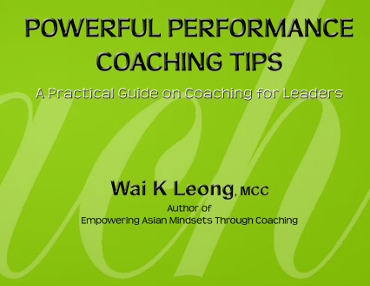The Coaching Myths

This is a generalization. While it is true that the initial stages of the coaching process requires the managers to work on their coaching skills and for the coachee to accept coaching as a corporate practice, coaching in it self saves time in the long run.
Most managers teach and direct their subordinates to a solution that they hope will resolve work challenges and issues. They rationalized that this saves more time and it get things going. While it may save time as far as that issue is concern, the manager will continue to get an avalanche of other similar issues to work at when he continues using this approach.
When done properly and the coachee finds value, it save tremendous amount of the manager's time in getting too hands-on with understanding the coachee's issues. The coachee will, self-coach themselves, before the meeting and meets the manager with a more clearly defined issue and alternative options for discussion.
Coaching weakens the position of the manager
The rationale goes that if a manager supposed to be more knowledgeable ends up not helping the subordinate by giving advice and solutions, then what is the value of the manager in this case. He might as well not be there if all he does is asking questions and getting the subordinate to look for the answers themselves.
This myth is perhaps on of the biggest barrier that the manager himself needs to overcome in him that is his perceived value of a manager, as a problem solver.
Let's take a look if this reasoning is valid. Assuming that a manager has expert knowledge of his work by virtue of his years of experience in the same area or industry, by adopting the coaching approach, it does not, in any way, erode the perception of him by his subordinates that he has no value. He has merely chosen to help his subordinates learn through the coaching method and his subordinates would respect him for having faith and trust in them to search for a solution.
Now what if the manager is a young person who does not have the level of knowledge of his subordinates who have been working in that area or department for umpteen years? Does the coaching approach diminishes his value or does it enhance his effectiveness? I'm more likely to believe that it will enhance his effectiveness. Imagine you, a young manager, trying to tell an experienced subordinate how to solve a work issue with your limited experience. It would be like teaching an adult how to suck eggs (an Asian way of saying teaching a duck to swim!) If the coaching approach was adopted, the subordinate would view it as you are respecting his wealth of knowledge and you are leveraging on his expertise to work on the issue. Animosity and ill-feelings would be greatly reduced and motivation to work as a team would increase.
Coaching is a good way of directing subtly
Coaching and directing are polarities apart. They are not similar at all. Managers end up thinking that they are coaching them their subordinates when in actual fact, they are telling and directing them. Some managers may have sharpened their skills at directing so well that they do it under the guise of possible suggestions to their subordinates from which they have already made up their minds.
You don't provide any solutions in coaching.
This is another common myth held by some coaches. In certain stages of the coaching process, the coachee might want to hear what you think about the issue and how you would approach it if you were to be in his position. He values your experience and would like to gain an additional insight of the issue.
It this juncture of the coaching relationship, it is important that you share your thoughts about the situation and how you would go about resolving it. By avoiding sharing your insights and possible solutions you are doing injustice in helping the person expand his consciousness and knowledge. You will know when you have reached this stage when you feel the coachee has honestly played his part in looking for a solution and due to his limited experience; he is unable to proceed forwards. At this stage of the coaching process, you may want to share responsibility by suggesting that both of you jointly explore options by you giving a possible alternative first followed by him. You may want to start by saying "Let's explore what options we have here. I'll start first and you can contribute next. One option is ...."
In this way, you are leading the way for him to look at possibilities. You become the catalyst of change and growth. If the low performance is due to a technical skill barrier, you do not coach but you teach or you coach him to look for a teacher.
Coaching is for problematic and weak people only
Coaching improves performance. The good gets better and weaker ones gets stronger. Top executives seek coaching either by paying on their own or through corporate programs. Top athletes have coaches. Tiger Woods has one. If these examples are anything to go by, it should immediately remove this myth. Top athletes and top executives have reached a level where they pretty much have nothing new to learn. Their function of their coach is more as mirrors reflecting and providing feedback on what they observed and challenging their paradigms. Imagine what value other people can gain from coaching when top executives themselves find value in this process.
If coaching fails, use tough methods to raise performance
Most people view coaching as a soft approach to improve performance on issues related to the will (motivation) to perform. If the soft approach fails, then it is alright to use the hard approach. Coaching is not a soft approach although the word conveys some level of care and support in it. Coaching can take on a tough stand too. Through the process of coaching, a person can be made to realize that he has choices and that he has made these choices consciously or unconsciously. A coach can help him see that if he continues to do what he is doing, then he will have to face the consequences of his actions and choices. Thus any action taken on him subsequently by the manager will not be construed as being unfair when the coaching process is done.
Services
-
Leadership Development
Leadership is a habit. It is a choice made by individuals
-
Coaching For Performance
Coaching staff for performance have become one of the most important Leadership skills to master.
-
Teambuilding
Great changes are taking place in Asian organizations as they are around the world.
-
Customer Service
Despite the public relations hoopla that surrounds customer service today;
-
Sales workshop
If you want your sales force to blow away the competition they need to master the skill of High Impact Selling (HIS).
-
Executive Coaching
Leadership coaches provide guidance which allows the leader to improve themselves.
-
Business Coaching
New and existing entrepreneurs are constantly looking for innovative ways to improve their businesses.
-
Life Coaching
Achieve your goals on time and live your ideal life, by removing barriers and challenges from your life.
-
Strategy Develop
Developing strategy that maximizes shareholder value is a result of a deep and detailed understanding of the economics...
Recent News

Empowering Asian Mindsets Through Coaching
Publisher: Pelanduk Publishing Company
Book Size: 5.4 MB or 228 pages
Reference

I am always impressed with Wai's ability to be with the client and coach them from where they are. He brings clarity and authenticity to his coaching. He is able to reach the heart of the matter with grace and skill.
Joanne Waldman
M.Ed, PCC, LPC, NCC
New Perspective Coaching

Wai has a very professional Coaching Presence. He consistently listens on a deep level-he has a true talent here. He moves his client skillfully to Designing Actions, based on the client's focus. He is very honoring of his clients and asks good follow-up questions.
Sheri Boone
MCC, CL
Inspired Mastery


